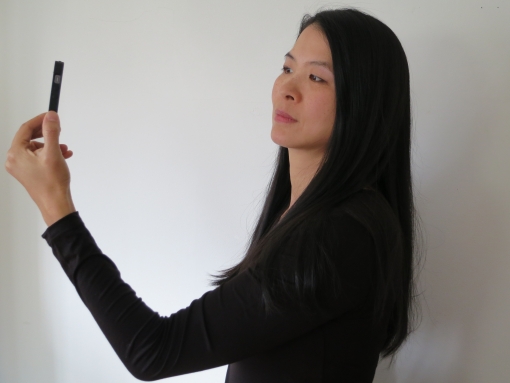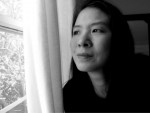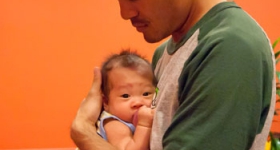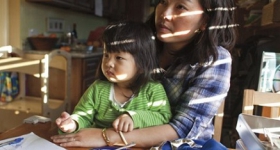Illustration by Shannon May
My mother called like
she did every week. "How are you?" she asked in Mandarin.
"Fine," I
lied.
"How's the
baby?"
"Good."
That was true.
Then, once again, I
rushed her off the phone. "I'd love to talk but the baby's crying."
"Okay, I know
you're busy," she said. "Don't worry. I'll call you next week."
The baby wasn't
crying. She was sleeping. I wasn't busy. I could barely do anything. I couldn't
sleep, couldn't eat, could hardly dress myself.
After I hung up I pushed away from the
table to lie down. I had used all my energy trying to sound normal.
How could I tell my
70-year-old mother who had finally become a grandmother the truth—that I was
going crazy, that in two months since giving birth I had gone from being
thrilled to fighting thoughts of killing my baby and myself?
I pictured my mother
in the kitchen of my childhood home in Jersey, placing the phone back in its
cradle before knitting another pink sweater for my daughter Anza despite the
pain in her diabetic hands. She was probably sitting there, gray permed hair gripped
by a plastic headband, eyes switching from smiling to intense (so much like Anza's),
trying to decide how else she could help. I could see her packaging more baby
clothes, gifts from church. Later, she sent an email: "Don't forget to
write thank you cards to my church friends. And don't forget to work on your
belly weight."
I wanted to say: I'm not okay, Mom. I'm
so tired it hurts. I feel like I'm being electrocuted in a tub of ice water. I
sweat. I shake. I have panic attacks. I don't know what's wrong with me. I'm so
scared.
I didn't know I had
postpartum depression—postpartum anxiety to be exact. Even after I found out
and was diagnosed with severe PPD a month later, I lied. Even after I was put
on anti-psychotic medicine, even after I was registered at the mental hospital
in Berkeley, I lied. I lied, because I didn't want my parents to worry. It
seemed the right, Confucian, filial thing to do, to protect one's elderly
parents from one's own suffering. Most of all I lied because I didn't want to
be judged. I already felt like such a failure. I was failing as a mother and I
was ashamed.
Four years ago I had
three miscarriages. "You're not careful enough," my mother said.
"You're too active." While I was pregnant with Anza, I learned I had
balanced translocation, a genetic condition. We needed to get lucky. Even after
explaining this to her, my mother would insist: "Go on bed rest so it
doesn't fall out."
I couldn't risk
hearing words that sounded like blame. I already felt it was my fault: I was
too soft.
My grandmothers
combined had birthed and raised 15 children while fleeing the Japanese, the
Communists, and poverty. What right did I have to fall apart?
So I took selfies of
me and Anza smiling and sent them to my parents every day.
 Photo courtesy of Sharline Chiang
Photo courtesy of Sharline Chiang
I lied because even
though depression is so common in Asian American communities, we rarely talked
about it. The message I grew up with: your mental struggles are our own; it's
up to you to find the inner strength to "ren," to endure.
The character for
"ren" 忍 is the
character for "knife" over the "heart." Endure even when
there's a knife in your heart.
In my thirties I
discovered talk therapy, tried to get my parents to go. Their response was
basically: "That's for white people." "They hook you in,"
my mother said. "You can never be cured."
I wish mental illness
didn't come with stigmas. I wish I could have told my parents that my mind had
broken just as easily as if I had to tell them my arm had broken.
Whenever my husband
would say, "You really should tell them," I felt that chasm again
(he's white, son of hippies). To him it was unimaginable to suffer the darkest
period of your life and not tell your parents. Meanwhile, everyone in his
immediate family knew. His mother and brother moved down from Canada to help
take care of me.
The fact that I could
get PPD never crossed my mind. I had
no history of depression.
Two years ago while
pregnant with Anza, I had spent thousands of hours reading about pregnancy and
birth and exactly five minutes reading about postpartum depression.
On the cover of the
brochure was a white woman with long brown hair. She was staring into space
under the words: “Feeling Blue?” I took one look and said to myself: white
woman, sad woman, that's not me and that's not going to be me.
I was 41. I had
traveled the world, had a great career in nonprofit communications, and had
married the man of my dreams. We lived in sunny Berkeley. We were finally
having a baby. I was elated.
Looking back I wish
more doctors had talked to us about PPD, its signs and how to get help. I wish
someone had told us about Postpartum Depression Spectrum because PPD manifests in so many ways, including intense
anxiety. I also wish I had been given articles written by survivors, especially
other API women.
I got lucky. I found
a psychiatrist who diagnosed me in time (I didn't go to the hospital). The
medication—Seroquel, Klonopin, and Zoloft—worked on me with no side effects.
In six months, with the help of a therapist and support group, I stabilized
significantly and was pretty much back to "myself" within a year.
I'm slowly accepting
that there is a new me. The new me is more sensitive to stress. Like any
survivor of a health crisis, I try to remind myself to manage my stress levels
and overall health.
By the time my
parents visited us again Anza was six months old. I was doing much better. They
watched her eat her first solid food (mashed yams). It didn't make sense to
bring up my ordeal.
I don't like lying to
my parents. They deserve my honesty. If they ever read this, I want to say I
hope you can forgive me and see that I did this out of love, love for you, and
love for myself.
I hope if they come
across this, or any of my other articles about my experience, they can
understand that I'm trying to share my story to encourage other survivors to
tell their stories, so we can let other women know that that they are not
alone, that they're part of a larger family of women who have been there
too.
+ + +
Sharline Chiang is a writer based in Berkeley, originally from New Jersey. She is a proud, long-time member of VONA, an amazing community of writers of color. Sharline previously wrote a piece for Mutha magazine about her experience with postpartum depression and anxiety.










Comments